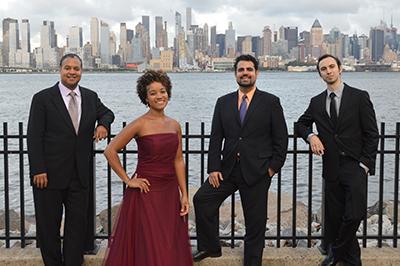by Mike Telin

On Thursday, January 17 at 7:30 pm at the Ford Family Recital Hall in Youngstown, the Harlem Quartet (Ilmar Gavilán and Melissa White, violins, Jaime Amador, viola, and Felix Umansky, cello) will perform works by Beethoven, Bolcom, Gillespie, Gavilán, and Debussy. The concert is presented as part of the inaugural Donald P. Pipino Concert Series. Tickets are available online.
The program will open with Beethoven’s Quartet No. 11, Op. 95 (“Serioso”). “It’s beautiful, concise, and compact, and makes a great program opener,” first violinist Ilmar Gavilán said during a recent telephone conversation.
The Quartet will continue with William Bolcom’s Three Rags for String Quartet, a work they had the honor of playing for the composer. “We were lucky to meet him,” Gavilán said. “He was very nice and impressed that we were not afraid to improvise. We were nervous, but he was pleased that we took liberties, especially in the repeated sections. ‘Poltergeist’ and ‘Incineratorag’ are great fun, and ‘Graceful Ghost’ is a beautiful piece that he dedicated to his late father.”
The violinist said they “love” playing Dizzy Gillespie’s A Night In Tunisia. “We get to morph into a real jazz group. We even change our sound — we don’t want to sound like an opera singer performing rock.”
The opportunity to present Cuarteto en Guaguancó to audiences is always special for Gavilán. “My father, Guido López-Gavilán, who is the retired conductor of the Havana Symphony Orchestra, wrote the piece.” The violinist noted that the work is based on an Afro-Cuban dance from the 1800s. “It incorporates the rumba clave, which is based on traditional African chanting.” The piece requires the players to bow and play pizzicato at the same time, and drum on their instruments. “It’s a lot of fun but the drumming part is not so easy.”
The program will conclude with Debussy’s Quartet in g. “It’s no accident that this closes the program,” Gavilán said. “Debussy’s music influenced the sound of early jazz, and he was influenced by ragtime. The piece is all about cross-pollination — the second movement is based on Indonesian gamelan, specifically from Java.”
The Quartet was founded in 2006 by the Sphinx Organization with the mission of bringing classical music to inner-city school children, Gavilàn said. All four original members were First Place Laureates of the Sphinx Competition. Gavilán and Melissa White are founding members, while Jaime Amador joined in 2012, and Felix Umansky is the ensemble’s newest member.
“We started with that mission, and we went to every school in Harlem — it was a social mission as well. And we originally added some jazz to the program just to hold the attention of the students.”
It turned out that jazz was a natural fit for the Quartet. “Everyone in the group has always called me the resident jazzer because I have the Cuban sounds in my soul,” Gavilán said. In addition to his father, his brother is also a well-known classical and Latin jazz musician. “Jazz is an aural tradition — it all starts with the ear. Chick Corea says that you have to detach yourself from the page, that you learn by doing.”
In addition to Chick Corea, the Quartet has collaborated with jazz musicians such as Aldo López-Gavilán, Paquito D’Rivera, Eddie Daniels, Tim Garland, Ted Nash, Gary Burton, Stanley Clarke, and John Patitucci.
“I have to say that learning jazz helps us play classical music better,” Gavilán said. “It gives us the skills that allow us to be more spontaneous. It gives us the gift of being free and precise. But we strive for excellence in all the music we play — being spontaneous doesn’t give you a license to play out of tune or not together.”
Published on ClevelandClassical.com January 15, 2019.
Click here for a printable copy of this article




